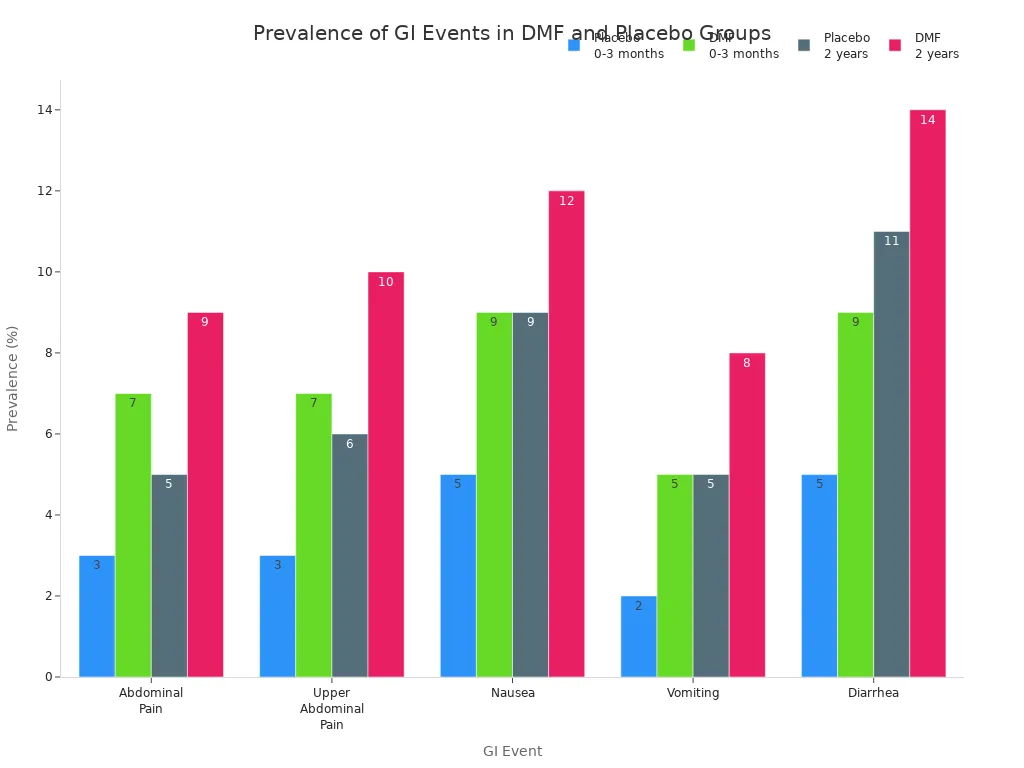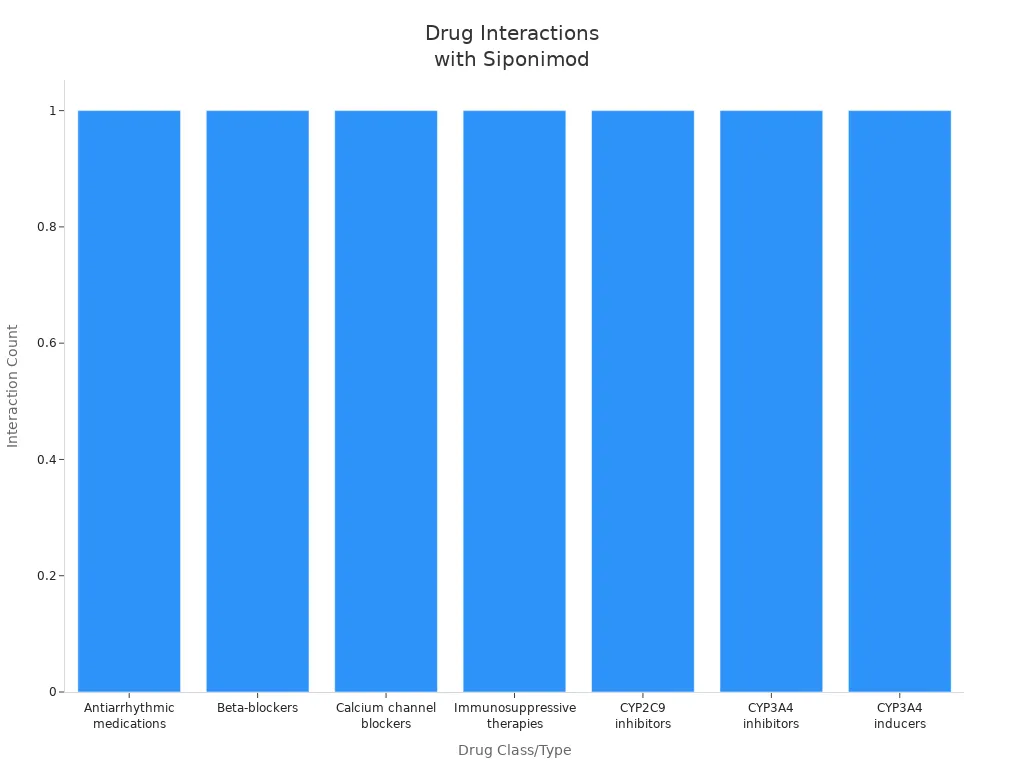
Fumaric acid can lead to different side effects. Some are mild, and some are serious. Many people get an upset stomach, flushing, nausea, diarrhea, or red skin. You can see how often these happen in the table below:
| Adverse Reaction | Percentage of Patients |
|---|---|
| Flushing | 40% |
| Nausea | ≥10% |
| Diarrhea | ≥10% |
| Abdominal Pain | ≥10% |
Some side effects of fumaric acid can be very serious. These include kidney problems or low white blood cell counts. People with kidney problems should be careful. Pregnant women should also watch for symptoms. People taking certain medicines need to be alert too.
Common Side Effects of Fumaric Acid

If you take fumaric acid, you might get some side effects. Most are not serious, but you should watch how you feel. Here is what you should know about the most common problems.
Gastrointestinal Issues
Stomach problems are very common with fumaric acid. You might have stomach pain, nausea, vomiting, or diarrhea. These issues often start soon after you begin taking the medicine. Many people see these symptoms get better as time goes on.
Check the table below to see how often these problems happen. The numbers show what happened to people who took fumaric acid (DMF) and those who took a placebo.
| GI Event | Placebo Group (0-3 months) | DMF Group (0-3 months) | Placebo Group (2 years) | DMF Group (2 years) |
|---|---|---|---|---|
| Abdominal Pain | 3% | 7% | 5% | 9% |
| Upper Abdominal Pain | 3% | 7% | 6% | 10% |
| Nausea | 5% | 9% | 9% | 12% |
| Vomiting | 2% | 5% | 5% | 8% |
| Diarrhea | 5% | 9% | 11% | 14% |

Nausea and diarrhea happen more in people who use fumaric acid. In the first few months, about 9% of users get nausea and diarrhea. After two years, 12% get nausea and 14% get diarrhea. Serious stomach problems are rare. Less than 1% of people have severe issues.
Tip: Eating food with your medicine may help your stomach feel better.
Flushing and Skin Reactions
Flushing and skin reactions are also common side effects. You might feel warm, red, or itchy on your face or body. These reactions usually start soon after you begin taking fumaric acid. Most people see flushing and redness get better after the first month.
- Flushing and skin reactions happen a lot, especially when you start treatment.
- You may feel sudden heat or see redness on your face.
- These reactions are usually mild, but sometimes they are strong enough to make you stop the medicine.
- Taking aspirin before your dose can help with flushing.
- If you have itching, antihistamines may help.
Skin reactions depend on how much medicine you take. They usually happen soon after you start treatment.
Other Mild Side Effects
You may also notice other mild side effects. These can be headache and tiredness. Most people find these easy to handle.
| Side Effect | Reported Rate |
|---|---|
| Fatigue | 1% to 10% |
| Headache | 1% to 10% |
Almost 90% of people who use fumaric acid report at least one mild side effect. Serious side effects are much less common. Only about 4% of users get them.
Note: Most mild side effects go away as your body gets used to the medicine.
If you notice any of these side effects, keep track of your symptoms. Talk to your doctor if they do not get better or if they bother you.
Serious or Less Common Side Effects
Some side effects from fumaric acid do not happen often, but they can be very serious. You should know about these because they can hurt your health. Watch for any strange symptoms and tell your doctor if you notice them.
Kidney Disorders
Fumaric acid can sometimes cause kidney problems. One of the worst side effects is Fanconi syndrome. This problem changes how your kidneys work. You might feel tired, have sore muscles, or pain in your joints. Doctors may find low phosphate, sugar, or protein in your urine when they check for kidney damage.
- You could have:
- Feeling weak
- Aching muscles
- Pain in your joints
Doctors use tests to look for kidney damage. Here are some things they might find:
| Laboratory Finding | Result Description | Statistical Significance |
|---|---|---|
| Plasma and urine fumarase activity | Gets much higher after kidney injury, linked to malate/fumarate ratios | N/A |
| Plasma creatinine level | Goes up by 91% after kidney injury | p = 0.0002 |
| CrCl and BUN levels | Drop by 44% and 30% after kidney injury | p = 0.04 and p = 0.003 |
| NGAL and KIM-1 markers | Go up a lot compared to healthy kidneys | p = 0.01 and p = 0.03 |
Note: Kidney problems do not happen often, but they are very serious. Always tell your doctor if you feel weak or your muscles hurt.
Lymphopenia and Low White Blood Cell Count
Fumaric acid can make your white blood cell count go down. This is called lymphopenia. It makes it easier for you to get sick from infections. Studies show about 30% of people had lower lymphocyte counts after one year. About 6% had very low counts.
- You might see:
- Lymphocyte counts drop by 30% in the first year
- Grade 3 lymphopenia in 6% of patients
- 32.6% of patients get lymphopenia
- 8.1% get grade 1, and 24.4% get grade 2 or 3 lymphopenia
If your white blood cell count gets too low, you can get more infections. Some people get very bad infections like progressive multifocal leukoencephalopathy (PML). Doctors check your blood every month. If your count goes below 500/μL, you must stop taking the medicine. If it drops below 700/μL, your doctor might lower your dose.
Tip: Getting blood tests often helps find problems early and keeps you safer from infections.
Allergic and Liver Reactions
You can have allergic reactions or liver problems when you take fumaric acid. Allergic reactions can cause a rash, swelling, or trouble breathing. Liver problems can show up as higher liver enzymes or even liver damage.
| Evidence Type | Description |
|---|---|
| Case Report | In 2016, doctors found the first case of severe liver injury from dimethyl fumarate. |
| Observational Study | From 2013–2016, 14 cases of liver injury were linked to dimethyl fumarate, 10 needed hospital care. |
| Liver Enzyme Elevation | 25% of people with psoriasis had moderate increases in liver enzymes. |
A short-term rise in liver enzymes happens in about 62% of people who use fumaric acid esters. Some people have problems with how their liver works. If you see yellow skin, dark pee, or pain in your upper stomach, call your doctor right away.
Alert: Liver problems are very serious. Watch for signs like yellow skin or dark pee.
Inhalation Risks
Breathing in fumaric acid powder can cause problems. You might get a sore throat, cough, or trouble breathing. Breathing in the powder can also hurt your kidneys. Always be careful with fumaric acid and try not to breathe in the dust.
- Breathing it in can cause:
- Irritation in your throat or lungs
- Kidney damage
Safety Tip: Wear protective gear when using fumaric acid powder to help keep yourself safe from serious side effects.
Who Should Be Cautious with Fumaric Acid

Pregnant or Breastfeeding Women
If you are pregnant or breastfeeding, be careful with fumaric acid. Groups like the EMA and FDA say you should think about the risks and benefits. The drug does not go into breast milk much, but it could still hurt your baby. Doctors do not know for sure if it is safe for infants. Always talk to your doctor before you start or keep taking this medicine. Your doctor can help you choose what is safest for you and your child.
Pre-existing Conditions
You need to be extra careful if you have health problems. People with kidney, liver, or heart issues have a bigger chance of bad side effects. Kids and older people may have stronger reactions to the medicine. If you have allergies, you might get rashes or breathing trouble. Studies show people with psoriasis or depression often stop taking the medicine because they feel more side effects. Tell your doctor about all your health problems before you use fumaric acid.
Tip: Write down your health problems and show the list to your doctor.
Siponimod Fumaric Acid and Drug Interactions
If you take siponimod fumaric acid for multiple sclerosis, watch out for drug interactions. Some medicines can change how siponimod fumaric acid works or make side effects worse. Heart medicines like beta-blockers or calcium channel blockers can slow your heart too much. Immunosuppressive drugs can make it easier for you to get sick. Medicines that change liver enzymes, like fluconazole or erythromycin, can change how much siponimod fumaric acid is in your body.
| Drug Class/Type | Interaction Type | Clinical Implication |
|---|---|---|
| Antiarrhythmic medications | Makes heart rate go lower | Higher risk of slow heart or heart block |
| Beta-blockers | Makes heart rate go lower | Higher risk of slow heart or heart block |
| Calcium channel blockers | Makes heart rate go lower | Higher risk of slow heart or heart block |
| Immunosuppressive therapies | Raises risk of infections | Easier to get sick because of weak immune system |
| CYP2C9 inhibitors (e.g., fluconazole) | Raises siponimod levels | Stronger drug effects and more side effects |
| CYP3A4 inhibitors (e.g., erythromycin) | Raises siponimod levels | Stronger drug effects and more side effects |
| CYP3A4 inducers (e.g., rifampin) | Lowers siponimod levels | Siponimod may not work as well |

Doctors say you should be watched closely if you use siponimod fumaric acid with other immunosuppressive drugs. Ask your doctor about all your medicines to stay safe from bad interactions.
What to Do If You Notice Side Effects
When to Seek Medical Help
You should pay close attention to your body when you start taking fumaric acid. If you notice symptoms that seem severe or unusual, you need to contact your doctor right away. Some warning signs include trouble breathing, swelling of your face or throat, yellow skin, dark urine, or very bad stomach pain. These could mean you have a serious reaction. If you feel weak, have a high fever, or get frequent infections, you should also seek medical help. Doctors can run tests to check your blood and organs. Quick action helps prevent bigger problems.
🚨 Alert: Call 911 or go to the emergency room if you have trouble breathing or lose consciousness.
Managing Mild Symptoms
Many people experience mild side effects when they use fumaric acid. You might feel flushed, get a headache, or have an upset stomach. You can often manage these at home. Try taking your medicine with food to reduce stomach problems. Drink plenty of water to stay hydrated. If you feel itchy, ask your doctor about antihistamines. Rest can help with fatigue. Keep a journal to track your symptoms and see if they improve over time.
Tips for managing mild symptoms:
- Take medicine with meals
- Drink water throughout the day
- Use over-the-counter remedies for itching or headaches
- Get enough sleep
Note: Mild symptoms usually get better as your body adjusts to the medicine.
Reporting Side Effects
You play an important role in keeping yourself safe. If you notice any potential side effects, report them to your doctor or pharmacist. You can also use the FDA’s MedWatch program to share your experience. Reporting helps doctors and scientists learn more about how fumaric acid affects people. Write down what you feel, when it started, and how strong the symptoms are. This information helps your healthcare team decide what to do next.
| What to Report | How to Report |
|---|---|
| Type of symptom | Tell your doctor |
| When it started | Use MedWatch online |
| How strong it feels | Call your pharmacist |
📝 Tip: Keep a record of all your symptoms and share it during your appointments.
How to Minimize Possible Side Effects of Fumaric Acid
Safe Use Tips
You can lower your risk of problems by using fumaric acid safely. Always follow your doctor’s instructions. Take your medicine at the same time each day. Swallow the pills whole with water. Do not crush or chew them. Eat a small meal before your dose to help your stomach. Store your medicine in a cool, dry place. Keep it away from children and pets.
Safe Use Checklist:
- Read the label every time
- Take with food if your stomach feels upset
- Use a pill organizer to avoid missing doses
- Wash your hands before and after handling the medicine
💡 Tip: If you forget a dose, take it as soon as you remember. Skip it if it is almost time for your next dose.
Monitoring and Check-ups
Regular check-ups help you catch side effects early. Your doctor will order blood tests to check your liver and kidney health. You may need tests every month at first. Write down any new symptoms you notice. Bring your notes to each appointment. Ask your doctor about your test results. Stay alert for changes in your body.
| What to Monitor | How Often | Why It Matters |
|---|---|---|
| Blood cell counts | Monthly | Detects infections |
| Kidney function | Every 3-6 months | Prevents kidney damage |
| Liver enzymes | Every 3-6 months | Finds liver problems |
📝 Note: Early detection helps you avoid serious health issues.
Talking to Your Doctor
Good communication with your doctor keeps you safe. Tell your doctor about all your medicines and supplements. Share any allergies or health problems. Ask questions if you do not understand something. Report any new or strange symptoms right away. Your doctor can help you manage side effects and adjust your treatment if needed.
Questions to Ask Your Doctor:
- What symptoms should I watch for?
- How often do I need blood tests?
- What should I do if I feel sick?
- Can I take other medicines with fumaric acid?
📞 Alert: Call your doctor if you notice swelling, yellow skin, or trouble breathing.
You need to understand both common and serious side effects of fumaric acid. Watch for symptoms like flushing, stomach pain, or changes in your skin. Track symptoms that seem unusual or last a long time. If you notice new symptoms, talk to your doctor. Use what you learn to stay safe and make smart choices about your health.
Stay alert for symptoms. Quick action helps you avoid bigger problems.




